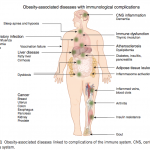

The Impact of Nutrition on Autoimmune Disease – Part 3 8 Comments Thursday, November 7th, 2013 Written by: Matt Baran-MickleBe sure to check out Part 1 and Part 2Metabolism and ImmunityThe obesity epidemic is widely recognized, and while the precise causes are not entirely clear, the presence of excessive nutrient intake and subsequent systemic metabolic dysfunction is not controversial. Obesity is frequently accompanied by a variety of conditions that are collectively referred to as the metabolic syndrome, including high plasma glucose, high plasma fatty acids/triglycerides, hypertension, and insulin resistance; immunological alterations in obesity are increasingly recognized as well, and the presence of chronic inflammation is a hallmark of the condition.(image: Kanneganti & Dixit, 2012)These immunological alterations are quite pronounced, and include the accumulation of activated lymphocytes and innate cells in obese fat tissue, and a depletion of Treg cells, as well as mucosal barrier disruption and dysbiosis. Recent work has begun to unravel the interrelation of immunity and metabolism, and provides some intriguing evidence for our developing understanding of autoimmune disease.Like every other cell, leukocytes require energy and metabolic substrate to maintain normal cellular function, and to divide and proliferate.
Original article:
Robb Wolf – Impact of Nutrition on Autoimmune Disease – Part 3



 For now classes are 6pm and 640pm at 2840 Wildwood st in the Boise Cloggers studio.
Book your class NOW!
click this ==>
For now classes are 6pm and 640pm at 2840 Wildwood st in the Boise Cloggers studio.
Book your class NOW!
click this ==>








